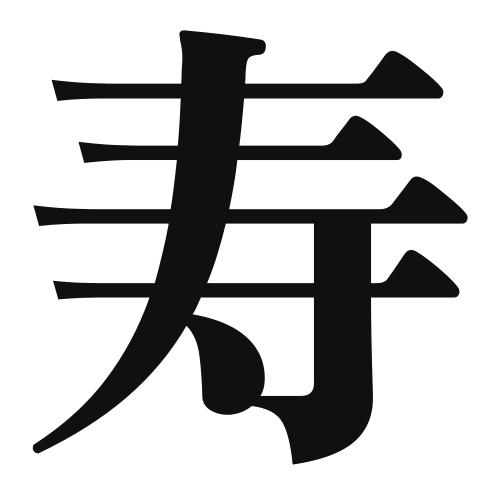1. Overview of Meaning
The kanji “寿” (pronounced “ju” or “kotobuki”) means “longevity” or “long life.” It is often associated with celebrations, especially in the context of birthdays and anniversaries, symbolizing good wishes for a long and healthy life.
2. Formation and Radicals
The kanji “寿” is a compound character that combines elements to convey its meaning. It consists of the radical “寿” itself, which represents the concept of longevity. The character is formed by the combination of the phonetic component and the meaning component, reflecting its significance in expressing long life.
3. Examples of Usage
Common words and phrases that include “寿” are:
- 寿司 (sushi) – a type of Japanese food.
- 寿命 (jumyō) – lifespan.
- 祝寿 (shukuju) – to celebrate longevity.
Example sentences in daily conversation:
- 「彼の誕生日を祝うために、寿司を作りました。」(I made sushi to celebrate his birthday.)
- 「おばあちゃんの寿命は90歳です。」(My grandmother’s lifespan is 90 years.)
4. Synonyms and Antonyms
Similar kanji with related meanings include:
- 長 (naga) – meaning “long,” but it does not specifically imply longevity.
- 生 (sei) – meaning “life,” which is broader and not limited to longevity.
Antonyms include:
- 死 (shi) – meaning “death,” which is the opposite of longevity.
5. Cultural and Historical Background
The kanji “寿” holds significant cultural importance in Japan. It is often used in celebrations such as Shichi-Go-San (a festival for children) and Kanreki (the 60th birthday celebration). Additionally, it appears in proverbs and idiomatic expressions, such as:
- 寿命を全うする (jumyō o mattō suru) – to live out one’s lifespan.
- 寿を祝う (kotobuki o iwau) – to celebrate longevity.
These expressions reflect the cultural value placed on longevity and well-being in Japanese society.
